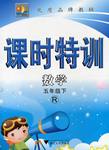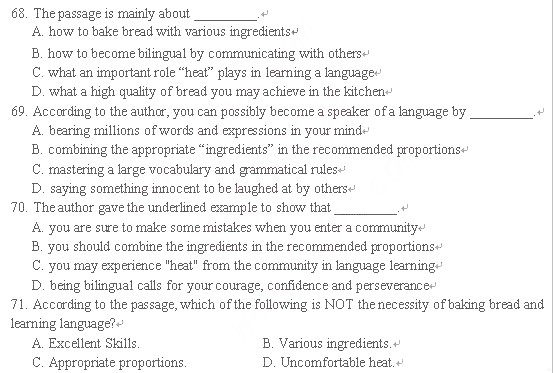题目内容
In elementary school, Guadalupe Quintanilla was often referred to as a “slow learner” by her teachers. But she really wasn’t slow at all. She just didn’t understand the language used in the classroom. Her problem was that she didn’t speak English. So she left school after the fourth grade.
When Guadalupe grew up, married, and had children of her own, she knew that her children were clever. But some of their teachers didn’t think so. The children were having trouble in school because they didn’t speak English. Mrs Quintanilla was angry. She didn’t want people to think that her children were slow learners. So she decided to learn English herself as a way of helping them. She practiced English. She looked up words in the dictionary. She asked the school headmaster to let her sit in on classes. It wasn’t easy, but she passed all her exams. She said that many of the other students helped her.
Mrs Quintanilla has helped her children with their lessons. Her two sons have won success. One is a teacher, and the other is a doctor. Her youngest child, a daughter, is studying in a university
- 1.
Guadalupe was called as low learner
- A.to make her study harder
- B.because she wasn’t clever
- C.because she stayed at home
- D.because she didn’t speak English
- A.
- 2.
According to the story, children who don’t speak English
- A.may have more trouble in school
- B.have trouble playing football
- C.often write a diary
- D.grow up to be teachers
- A.
- 3.
Which happened first?
- A.Guadalupe passed all her exams
- B.Guadalupe left school after the fourth grade
- C.Guadalupe had three children
- D.Her two sons won success
- A.
- 4.
The story is mainly about
- A.learning to sing and dance
- B.the problem of slow learning
- C.going to a university
- D.Mrs Quintanilla’s success
- A.
试题分析:
1.细节题。根据第一段倒数第二行Her problem was that she didn’t speak English 故 D正确
2.推断题。根据第二段第二句The children were having trouble in school because they didn’t speak English.故A正确
3.序列题。根据第一段最后一句she left school after the fourth grade.。故B正确
4. 主旨题。根据根据文章可知Quintanilla夫人由于不会说英语辍学,继而成功的培养了自己的两个子女,推出她本人获得成功的经历 故D正确
考点:考查人物介绍类短文
点评:本文题材属于记叙文。文章主要讲述了Quintanilla夫人的成功经历。考生在作答此类文章时,一定要弄清楚文章的主人公以及主人公的主要事迹,一定要在细节上多下工夫,缩短阅读时间,提高做题的正确率。

 课课练江苏系列答案
课课练江苏系列答案 名牌中学课时作业系列答案
名牌中学课时作业系列答案 明天教育课时特训系列答案
明天教育课时特训系列答案 浙江新课程三维目标测评课时特训系列答案
浙江新课程三维目标测评课时特训系列答案
Once upon a time, there was a scholar who wanted to gain more knowledge each day even though he had already gained enough knowledge. One day, he came to visit a saint and wanted to be his student. The saint provided some tea. He slowly filled the scholar’s cup: the cup was full, yet he kept pouring and pouring. The scholar burst out, “Stop! You can’t add anything to something that’s already full!” The saint set down the teapot and replied, “Exactly.”
Whether it’s the silence between notes in music, or some open time in your schedule, you need space to act effectively. Yet most of us, myself included, tend to stuff as much as possible into whatever room is available-closets, schedules, budgets, relationships, and even the mind itself.
However, some people know how to avoid overstuffing their life. For example, in Australia, it seemed that most people there operated at about 85% of their capacity(能力),unlike Americans pushing as close to 100% as possible. So when you run into Australians you know in the street, they have time to hang out and talk with you.
Remember the cup: its value is in the space, the emptiness it holds. How to empty your “cup”?
Be mindful of the element of space, openness , and emptiness in your life. This includes room in a drawer, the volume of air in a kitchen, and open-mindedness in a friend. Sometimes you’re just stuck with a big bucket of tasks yet to do. But at least empty the bucket faster than you fill it with new tasks. Put some space between finishing one thing and staring another. For example, after sending one email, take a breath before replying to another one. Drop the stuff you can no longer afford to lug around. At sea level, you can run with a brick in your backpack, but if you’re hiking on a mountain, that brick has got to go.
【小题1】By pouring water into the cup, the saint most probably wanted the scholar to know that .
| A.he should pay attention to details |
| B.he should keep learning every day |
| C.he had already gained enough knowledge |
| D.he should be very careful in order to succeed |
| A.work much harder |
| B.know less about their capacity |
| C.spare more time for themselves |
| D.spend less time with their friends |
| A.reach | B.carry | C.see | D.show |
| A.Example →advice→ conclusion →story. |
| B.Topic→ example →advice→ story. |
| C.Story→topic →example→advice. |
| D.Reason →topic →advice →example. |
| A.The art of life. | B.Value every minute |
| C.The art of drinking tea | D.Empty your“cup”at times |
